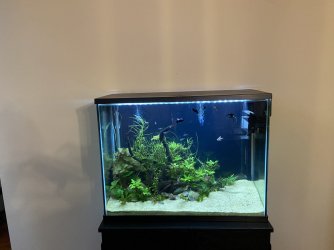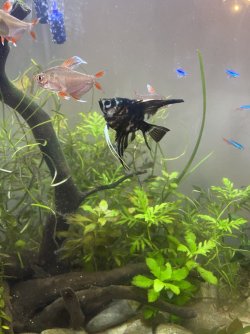The biggest problem we have with keeping fish is disease diagnosis. It is hard even when there are symptoms and almost impossible when there are none.
I could make a guess here but there would be little point. I do know that there are strains of columnaris that are quite virulent which means they kill fast and usually before there are aby symptoms one can see without a microscope. Many strains of this disease produce visable symptoms and can be way less virulent. however, this is just one such disease that can kill wihout there being symptoms.
However, the one thing that would argue against this being the cause is that it will kill most species in a tank not just one or two.
Neon tetra disease usually shows symptoms and takes some time to kill. Despite it's name it can be harmful/fatal to other species. This disease is caused by a parasite and there is still no known cure.
While I agree with Byron about not treating without knowing exactly what the problem is, sometimes there is no other option. One has to make a best guess and go with it. This stage is normally reached when fish continue dying in a tank. Then the options appear that doing nothing means they all will die v.s. taking your best shot. If one is wrong and they pretty much all die anyway. But if the best shot is the right decision, fish may be saved. This is not the same thign as no knowing and having time to determine what is wrong.
One important factor is how many of one's fish appear to be infected and are dying. I wish I could offer something more substantive here.
Water changes are great but the are not a cure-all by any means. Also, most nasty bacteria do best in warmer water and water which is not an acid pH. Unfortunately, these sort of things cannot be used with fish which do not do well in acid and/or cooler water. I have treated discus in 90+F water but I would never put them into say 72F water. Similarly, I would not try to treat a goldfish in those discus temps.
Often the way to diagnose and treat fish is in a hospital tank. This should be bare bottom and have a few fake plants. You need an airsrtone and heater but not a cycled filter. Instead you will do a lot of water changes. You only want things in an H tank you can bleach afterwards if the fish dies. Anything you cannot bleach must be thrown out. You can run a filter for circulation and to catch debris, but the media may have to be discarded in the end. This is why I do not use a cycled filter as I hate to have to discard good bacteria. Also, some meds will kill off the bacteria and you are back at square one re keeping the water healthy.
The reason for the bare bottom and minimal decor is to it is easy to observe the patient(s) but a few fake plants allow then to hide some which is a stress reducer. A bright ligh should not be ued and regualr water changes are needed. Depending on the tank size and the number of fish in it, either daily or every other day water changes should be done. If the fish are eating excess food is to be removed after about 5 minutes. Finally, when doing water changes on an H tank you often are lso dosing meds which need to be ay a specific level in the water.
If the water changes done in lieu of filtration and a med dosing are on the same day, do the water change and then dose the med. If the water change is done on a non-dosing day, you still need to replace the med that the water change removed. So a 50% change means add back a 1/2 dose of the med, etc.
The bare bottom tanks lets you seetwo things. You can observe the poop from the fish and you can often spot parasites that may be expelled. So before vacuuming, check the tank bottom and the fake plants. Do this every day onccce or more times even when you do not vacuum.





